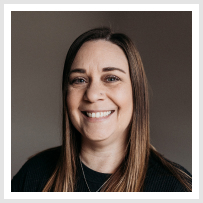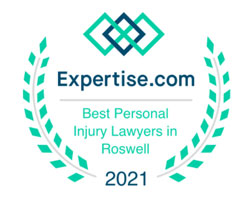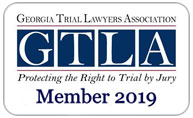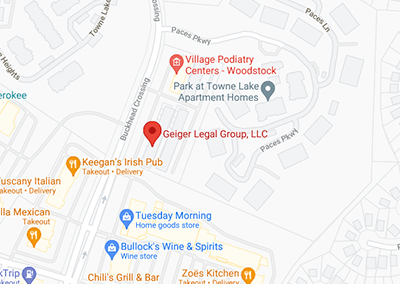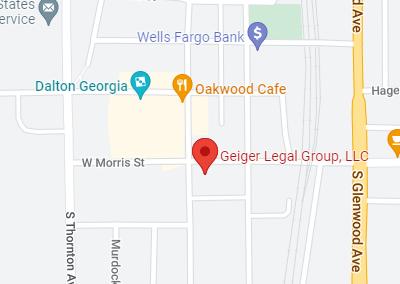Frequently Asked Questions Answered by Geiger Legal Group, LLC
Personal Injury FAQs
Personal Injury FAQs
Do I need a personal injury lawyer? Or can I handle this on my own?
In general, you should always consult with a personal injury lawyer after you have been in an automobile crash. Insurance companies are professionally trained to diminish the value of your case and force you into an early settlement. A personal injury lawyer equalizes the insurance company’s advantage in the negotiation.
When you are considering whether to hire a personal injury attorney, consider some of these questions.
What type of injury did you sustain? If you were taken to the hospital, or a follow up doctor’s visit revealed serious injuries in diagnostic testing, then you should absolutely consult an attorney. An example would be a broken bone, or bulged disc caused by whiplash.
In addition to seeking immediate medical treatment, you should be following the doctor’s orders for recovery. This is important for two main reasons: it gives you the best shot at a quick and safe recovery, and it shows you are in need of and committed to your recovery.
Is the at-fault insurance company fighting liability? Many times, insurance companies go against the findings by the responding police officer to try and help their insured – the at-fault driver. Sometimes, they may partially blame you for the crash, even when you had no fault at all. In this scenario, a personal injury attorney can help.
How recent was the accident? Georgia has a standard two-year limitation in which you need to file an action for injury to their person. If you fail to bring your claim within two years of the date of the crash, the court will deem your claim time-barred, meaning you can no longer recover.
Do you feel overwhelmed with constant medical bills? After a crash, you could easily incur over $7,500 in medical bills simply by taking an ambulance to the hospital for a brief evaluation. These bills will rise even further if you were admitted or surgery is required. A personal injury lawyer can assess your insurance plan’s medical payment policy to determine if any immediate payment can be made prior to a settlement.
Do I need to tell my personal injury attorney everything?
Yes! Be 100% forthright and honest with your attorney. First, make sure you vet your attorney before hiring them. But once you are working with them, it is their job to help assess everything about your case and do their best job to represent you. If there is information that comes out during a case (or trial) that they could have known before, it could undermine your entire case.
You are better off telling your attorney something you think may hurt your case so they can prepare for it, instead of letting them be caught by surprise later.
How can I be better prepared for a personal injury case?
The number one thing you can do to be prepared for a personal injury is to be healthy beforehand. Complete your physical every year (even better, every six months), get your bloodwork done, and take care of yourself. If an accident occurs, you can show definitive proof of the negative effects the accident had on you.
How long does a personal injury case take?
This is a common answer for questions regarding personal injury cases: it depends. It can take around 12-18 months, or sometimes longer. That is where your patience comes in. In general, personal injury cases should never be settled until you are fully recovered from your injuries, or your future medical treatment is well documented and affirmed to by your doctors. Because you have been injured by the fault of someone else, you should be paid for all of those injuries now, including any potential future surgery and treatments.
Sometimes, we are able to settle a case much faster than the average 12-18 months, but this strictly depends on the amount of insurance coverage that is available. For example, the at-fault party may only have $25,000 of coverage and does not have any assets to recover from. If your injuries far exceed that coverage within a few months following the incident, we may be able to resolve the case more quickly.
However, the legal system is slow. There are a number of hoops to jump through and time limits are set by statutes and judges. We will keep you informed of the status of your case, and whether we advise moving quickly or slowing the case down while you recover, all depending on your circumstances.
How much will a personal injury case cost me?
A personal injury case should not cost you anything out-of-pocket, just time and patience. Typically, personal injury attorneys work on a contingent fee basis, which means they are paid a percentage of the gross recovery from the case. That percentage ranges from 25% statutory for workers comp, up to 40% other personal injury cases. Personal injury attorneys should also front the cost to prosecute the case, such as cost to obtain medical records, filing fees, and expert testimony. Those costs are recouped by the law firm at the end of the case.
The fee charged should handle negotiation of the cost to repair or replace your car (property damage), gross settlement for your bodily and personal injuries, and negotiation of any and all liens related to the claim (such as health insurance liens). If an attorney seeks to charge you separately for each of these, or adds on additional fees (beyond the costs listed above), that is a red flag.
What should I be doing about my personal injury case right now?
Keep a record of everything. Save medical receipts, save receipts from anything you need to buy due to the accident (repairs, quality of life, etc), and record any time you are missing work (and income). Keep a journal of how you are feeling, your pain (commonly called a “Pain Journal”), and what you are going through. This will be important for proving how the accident has affected your life and to “quantify” the amount of suffering you are going through. It may seem blunt to talk about your situation like that, but the goal is to give you the best chance at recovery.
What documents can I sign for my personal injury case? Should I be signing anything?
Do not sign ANYTHING without a thorough review, preferably by a personal injury attorney. If you accept any kind of payment or reimbursement, or if you accept fault or responsibility for anything more than you should, that could have a detrimental effect on the outcome of your case. The insurance company is trying to pay the smallest amount possible to make a case go away. And they are going to do everything they can to make that happen. This may be the only time you have to deal with an insurance company, but they do this all the time. Do not underestimate their intentions.
What makes a personal injury a catastrophic injury?
Catastrophic injuries are severe types of personal injuries. There will generally be life-altering changes to someone’s body and/or life.
From a legal perspective, catastrophic injuries describes any injury that hinders a person’s physical or cognitive abilities. Examples include spinal injuries, traumatic brain injuries, loss of limbs, paralysis, severe burns, and other life-altering injuries that can fundamentally reduces your ability to be self-reliant.
A catastrophic injury may require someone to use specialized equipment for the rest of their life. Or it may require a remodel of their home so they can more easily take care of themselves.
What steps are involved in the personal injury claim process?
We created a short guide for what to do immediately after a car crash. But what’s the process after that?
If you haven’t already, you should always seek medical treatment for your injuries. Your injuries may seem minor at first, but it’s always best to have a doctor evaluate you to understand the extent of your injuries.
If you were sent to a hospital, especially by ambulance, then you should absolutely reach out to a personal injury attorney. In contrast, you may not need a personal injury attorney if you only have minor injuries. The only way to be sure, however, is to (1) go see a doctor for your injuries and (2) speak with an attorney. Most attorneys, including Geiger Legal Group, LLC, provide a free consultation.
At Geiger Legal Group, LLC, you can expect the following if we should handle your personal injury claim:
- Clear and easy communication between both your attorneys and paralegals. We know each client by name and update all of our clients bi-weekly on where their case stands.
- High-level advocacy and trial skills on your behalf to maximize settlements or verdicts.
- We are not a TV advertising firm and do NOT have 1,000+ cases so that you are just a number. We take a select number of cases and treat each case with the attention it deserves.
- Fairness. Our goal is NOT to make a quick buck off your case, but rather that you feel well represented so that you would be happy to recommend us to friends and loved ones.
If you have questions about how to handle your injuries or the personal injury claim process, you can call 770-720-4600 or text us at 770-741-2411 (you will get a response from a real human).
How do I get ready for a deposition?
A deposition is a testimony that occurs outside of the courtroom. In general, the opposing attorney asks questions that you are required to answer under oath. You should treat a deposition as if you are being called as a witness in a courtroom, as most anything you say during the deposition can be used in the trial if it is related to the case at hand.
Since a deposition is so important to the outcome of a trial, it is important for you to be prepared beforehand. While you should check in with your attorney ahead of time, these are some guidelines we recommend:
- Dress appropriately. You should dress like you are appearing in court.
- Ask for a break when needed. While depositions can be quite long, ask for a break if you need one. Georgia allows a witness to take a break if needed. This is not a sprint and breaks will always be accommodated.
- Take a breath and think before you respond. Lawyers like to try and ask tricky questions. Think about the question that is being asked and answer only the question that is asked.
- Tell the truth. This cannot be said enough. You are under oath. Assume that the attorney asking questions already knows the answers and is just getting a statement directly from you. Lying, hiding information, or telling conflicting stories will only hurt your case.
- Answer fully. If you are asked to list something, give the whole list. Don’t try to be smarter than the lawyer by excluding certain elements of an answer. Again, assume they already know the answer.
- Answer simply. On the other hand, unless the question is specifically requesting more detailed information, keep your answers to”yes”,”no”,or”I don’t know.”
What questions will be asked at a deposition?
The exact questions asked at a deposition may vary, but some examples of questions include:
- What types of injuries and illnesses have you had during the course of your life?
- What types of lawsuits or legal claims have you previously been involved in?
- Do you have a criminal record? If so, what crimes were you convicted for?
- Who was with you when the accident happened? Were there any witnesses?
- What is the nature of your injury?
- Are there activities you cannot do because of your injury?
At Geiger Legal Group, LLC, we meet and prep our clients on what the deposition experience will be like, potential tricky questions they’ll encounter, and other guidance specifically tailored for their case.
Accident FAQs
Accident FAQs video
Accident FAQs
What should I do after an accident?
Your safety (and that of your loved ones) is your top priority after an accident. There are a number of actions you should take in order to get safe, stay safe, and protect yourself. These include:
- Move to safety (if you are able)
- Get help from local law enforcement (do this first if you are injured and should not move)
- Document the accident to the best of your ability (take pictures and videos, and get the contact information for any witnesses)
- Seek medical attention
- Report the accident to your insurance company
- Call a personal injury attorney (if you need one)
In addition to the actions above, there are a few things you should NOT do:
- Do not wait to visit a doctor
- Do not communicate with the other party’s insurance company
- Do not sign anything or record statements
What do I do if the at-fault driver leaves after the accident?
First of all, do not try to follow or chase the other car. Do your best to remember the following:
- Their license plate number,
- A description of the driver, and
- the color, make, and model of the car
Call the police and describe the at-fault drivers info on the phone.
Then seek medical attention for any injuries suffered during the crash. Even if the at-fault driver is never located, your own insurance company will step in to cover the medical expenses for your injuries and the property damage to your car. This is another reason why it is important to carry add-on uninsured motorist coverage on your own car insurance.
Should I go see a doctor after an accident?
Yes! If you need to go to the Emergency Room, then please do so! What is important is that you visit a doctor as soon as possible after the accident. Your primary care provider or an orthopedic doctor are viable options, as long as they can fully examine you and document your injuries.
If you are covered by medical insurance, try to see an in-network doctor. This will help keep your upfront out-of-pocket costs down.
What doctor appointments do I need to go to after an accident?
Every recommended appointment and follow-up after your initial observation. If you skip an appointment, you are effectively saying you don’t really need the medical attention, and that can undermine your case. Setup events and reminders in your calendar and plan accordingly so you can make your appointments.
Insurance FAQs
Insurance FAQs video
Insurance FAQs
Should I tell my insurance company about my car crash?
Yes. You should let your insurance company know about your involvement in a car crash. Depending on your coverage, your own car-insurance benefits may help you with things like medical payments or uninsured motorist coverage, which could be applicable to your claim.
There is also a “notice requirement” in most car insurance policies. This notice requirement means your uninsured motorist or medical payment benefits could be denied unless you promptly notify your own car insurance company of the car crash. This should be done even if you are not at fault. So don’t think that you are better off by not telling your own car insurance company as that could cause a problem later on.
You may not want to speak with a trained insurance adjuster on your own. In that case, contact a personal injury attorney to deal with the insurance companies. While Geiger Legal Group, LLC’s criteria for accepting personal injury matters depends on the extent of your injuries, it is worth a phone call to discuss your options.
What if the insurance company offers me a check or payment?
This is incredibly important. The insurance company’s goal is to get you to accept the lowest possible amount (if any). And they are professionals. This is what they do for a living.
You should not accept any form of payment without reviewing it with your own professional.
A certain company(that claims to have you in good hands…) has been offering direct bank account deposits. This sounds great on the surface: some quick money to help start paying for your recovery bills.
But they consider that payment as completing their responsibility, and your acceptance of it as closing your case. And that number is almost always a fraction of the value you are owed.
Don’t accept any kind of check, deposit, or payment without having your case review by a personal injury attorney.
What do I need to know about automobile insurance coverage?
You should look into two kinds of coverage (hopefully you already have them if you have been in an accident):
- Uninsured / Underinsured motorist coverage (“UM/UIM”), and
- Medical Payment (Medpay) coverage
We discuss both in greater detail on our automobile insurance page.






